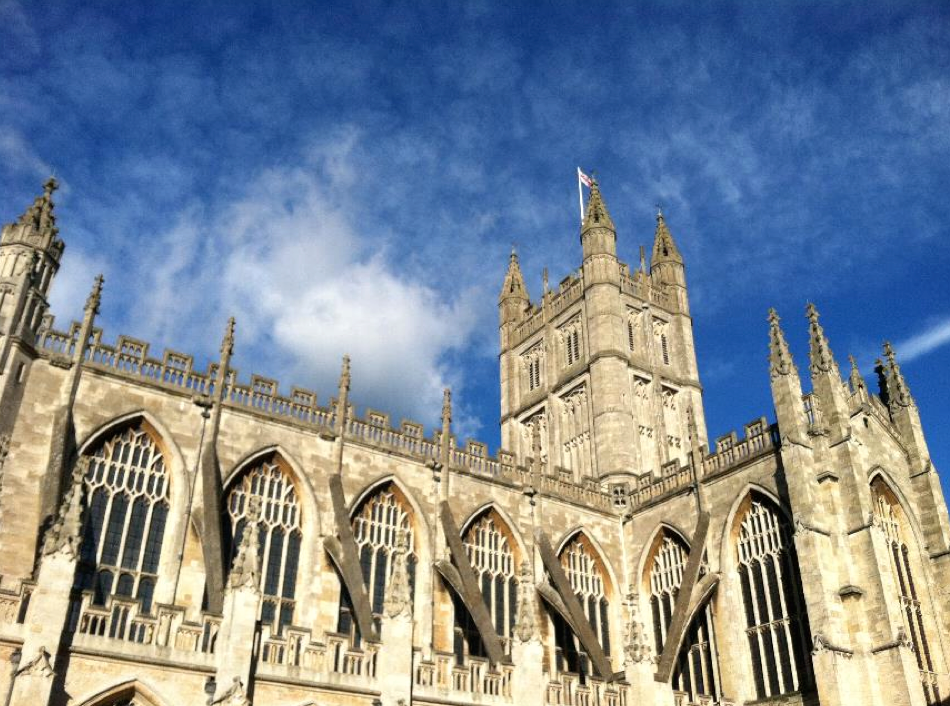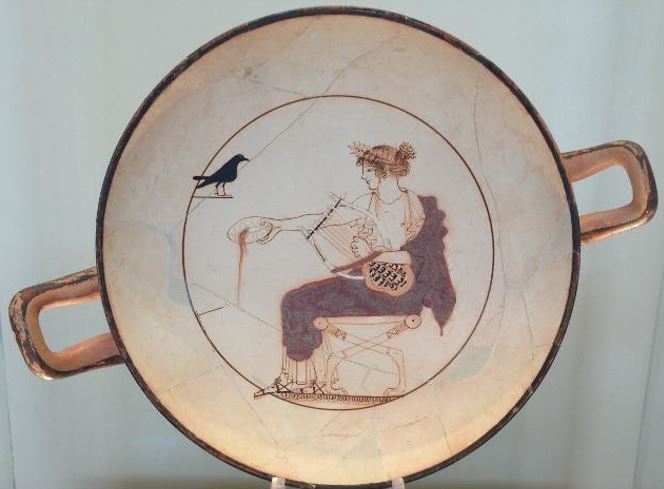Summer Opportunities in Classics
SEE-Beyond Awards
All students interested in summer experiences should apply for the See Beyond Award, a $4,000 stipend for a significant summer experience of six to ten weeks, to help fund your summer experience.



Summer Experiences
Please check the sites of each one for updated program information, dates and deadlines. Note that links may change over time, so if the direct links don't work, try searching for these or similar programs using the titles, or keywords.
Greek and Latin
City University of New York Latin/Greek Summer Institute
- What: intensive study of elementary-intermediate Latin or Greek in ten weeks, with a focus on the development of reading proficiency, including readings of major genres of literature (epic, dramatic, historiographic, etc.).
- When: June, ten weeks, five days/week, seven hours/day. Dates TBD
- Where: New York City, CUNY Graduate Center
- Costs: TBD
Living Latin in Rome: The Paideia Institute Living Latin program
- What: daily readings, rigorous grammar and syntax review, and active oral production of classical Latin with, among other instructors, Msgr. Daniel Gallagher, Papal Latinist
- When: June–July: five weeks, five days/week, four hours/day. Dates TBD
- Where: Rome—sites, museums—as a classroom in the morning; readings in ancient, medieval, or renaissance Latin in a classroom in the afternoon. Field trips beyond Rome on Saturdays to Tiberius' grotto at Sperlonga; Hadrian's villa at Tivoli; Pompeii; Mt. Vesuvius and the Sibyl's cave at Cumae; Ostia Antica and more. Sundays free.
- Eligibility: intermediate Latin required
- Costs: TBD
Living Greek in Greece: The Paedeia Institute Living Greek program
- What: daily readings, rigorous grammar and syntax review, and active oral production of Attic Greek
- When: August: two weeks, five days/week, three hours/day. Dates TBD
- Where: Selianitika, Greece, a seaside village. Theme: "Home and Homecomings," with readings in the morning from Xenophon's Oeconomicus and Lysias' On the Murder of Eratosthenes. Afternoons devoted to Homer's Odyssey, with discussions in Attic Greek! Study trips include a visit to Homer's Ithaca.
- Eligibility: intermediate Greek required
- Costs: TBD
- Contact: summergreek@paideia-institute.org
Archaeological Field Work
Kenchreai Excavations: Archaeology, History and Culture in Greece
- What: field school, seminars, and excursions centered at the Kenchreai excavations near ancient Corinth in Greece. Data analysis, artifact processing and conservation, architectural survey, stratigraphic documentation; plus lectures on ancient religion, biological anthropology, etc.
- When: May–June , dates TBD
- Where: Corinth and Kenchreai (beachside site), plus trips to Perachora, Mycenae, Nemea, Epidauros, and Nafplion
- Costs: TBD
- Contact: joseph.rife@vanderbilt.edu
Azoria Project Field School in Classical Archaeology
- What: field school focusing on excavation and recording techniques on Azoria, Crete, an Iron Age and Archaic Greek city. Lectures by specialists in ceramics, architecture, lithics, archaeobotanists, zooarchaeologists, and others round out the course.
- When: May–July, eight weeks, dates TBD
- Where: Azoria, near Kavousi in eastern Crete, Greece
- Costs: TBD
- Contact: canton@duke.edu
D.E.P.A.S. of Mycenae: The Lower Town
- What: excavation and field school program, including training in digging, recording, plotting, drawing, sifting, surveying, and recording, cataloguing, and studying artifacts, at the Lower Town outside the citadel walls. Program includes field trips to museums and sites in Athens, Nafplion, Argos, Tiryns, Corinth, Epidauros, Olympia, and Delphi.
- When: May–June. Dates TBD
- Where: Mycenae in the Argolid (Peloponnese), Greece
- Costs: TBD
- Contact: maggidic@dickinson.edu
Excavations of Roman provincial Dacia (modern Romania)
- What: three different excavations in Roman Dacia (now Transylvania), the NE provincial frontier
- Where and when: duration varies from four to five weeks in June, July, and August
- Contact: archaeology@archaeotek.org
American Academy in Rome Summer Program in Archaeology
- What: introduction to archaeological studies, working with the American Academy's collections
- When: TBD 2015
- Where: American Academy in Rome, plus visits to important sites and major collections of material; lectures and hands-on work with previously unstudied ceramic material; opportunity to join the University of Cincinnati's Pompeii Archaeological Research Project: Porta Stabia
- Costs: TBD
Excavating in the Aegean: The Case of Despotiko
- What: Learn the basic methods of stratigraphic excavation, in-field documentation, and architectural conservation under the direction of Yannos Kourayos, Director of the excavations at Despotiko, Greek Ministry of Culture
- When: May/June, dates TBD
- Where: Despotiko in the Cycladic islands, Greece
- Costs: TBD
- Contact: info@cyathens.org
Excavations of the baths at Roman Carsulae
- What: excavation of baths at Roman Carsulae with instruction in excavation strategies, techiniques and recording, handling, and conservation of artifacts, drafting of site plans and analytical rendering
- When: June/July. Dates TBD
- Where: Roman Carusae, located north of Rome in modern Umbria
- Costs: TBD
- Contact: ebarc2014@gmail.com
Other Excavation Opportunities
- For other excavation/field schools, see the Archaeological Field Work Bulletin, a database searchable by country, city, field school etc.
Travel-Study Programs
American School of Classical Studies Summer Programs
- What: intensive introduction to ancient-to-modern Greece with an emphasis on the topography, monuments, literature and archaeology
- When: two sessions, June/July/August, six weeks each. Dates TBD
- Where: based in Athens, with extensive side trips to Crete (six days), the Peloponnese (ten days), and northern Greece (seven days), visiting over 60 sites and museums
- Costs: TBD
- Contact: ssapplication@ascsa.org
American Academy in Rome Classical Summer School
- What: intensive study of the growth and development of the city of Rome through a careful study of material remains and literary sources
- When: TBD 2015
- Where: Rome!
- Costs: TBD
- Contact: lusnia.aarcss@gmail.com
San Gemini Preservation Studies Programs
- What: multiple programs focused on architectural survey and restoration, traditional methods of painting, conservation of archaeological ceramics, and the restoration of books and works of art on paper. The field projects involve survery and restoration of medieval churches, archaeological excavation in Roman city of Carsulae, and work on local archival material.
- When (sessions are four weeks, one program per session). Dates TBD
- Where: San Gemini, a small hill town in Umbria along the Via Flaminia
- Costs: TBD
- Contact: mcardillo@iirpsemail.org
Skidmore and Associated Institutional Programs
Advanced Studies in England in Bath: Roman Britain
- What: course on "Romans in Britain," in which students examine the impact of the Roman invasion of Britain and the role and function of Britain within the wider Roman empire. Topics such as imperialism and "Romanization" are explored within the context of the Roman city of Bath and the surrounding countryside. Concurrent enrollment in one other ASE summer course is required; for the rest of the curriculum, see website.
- Where: Bath and southwest England
- When: June/July. Dates TBD
- Costs: TBD
- Contact: admin@asebath.org
Internships
Internship opportunities through Skidmore
- What: Skidmore's Career Development Center is the place to consult about internship possibilities—both for credit and for pay—during the summer. Each summer's offerings are rich and varied and it is up to you to identify and apply for the internship that most suits your interests.
- Where: anywhere!
- When: throughout the summer
- Costs: vary dramatically, due to location and whether the internship is paid or for credit.
- Contact: CDC and Office of Academic Advising both are located in Starbuck, second floor. Once you have identified a possible internship opportunity, consult with any member of the Classics Department faculty for how that opportunity might complement your academic studies.
Internship at Harvard's Center for Hellenic Studies
- What: Harvard University's Center for Hellenic Studies offers paid internships in two fields: electronic publishing and curricular/conference support.
- Where: Washington, D.C., near Diplomatic Row (across the street from the Clinton residency)
- When: May–August. Dates TBD
- Cost: none; a paid internship, amounting to approximately $3,240